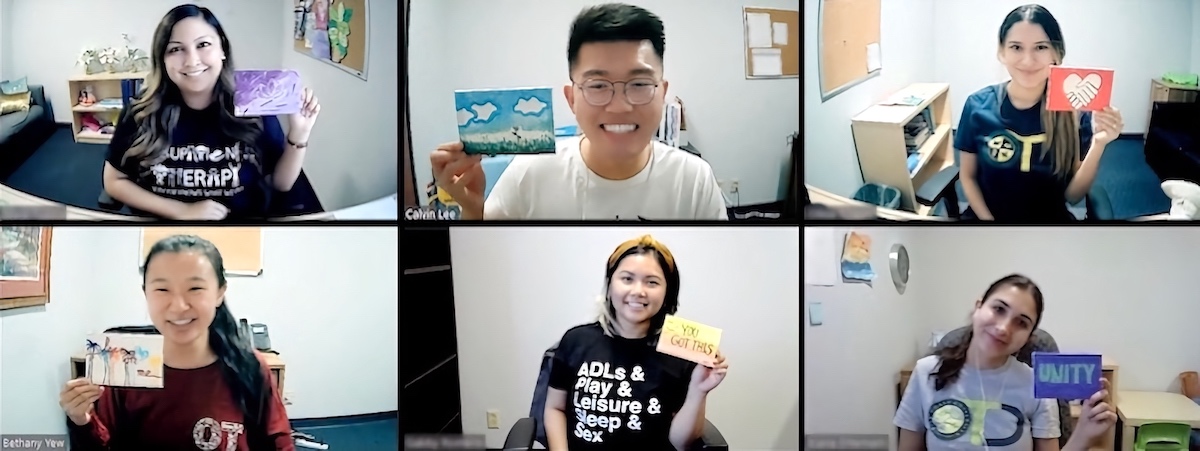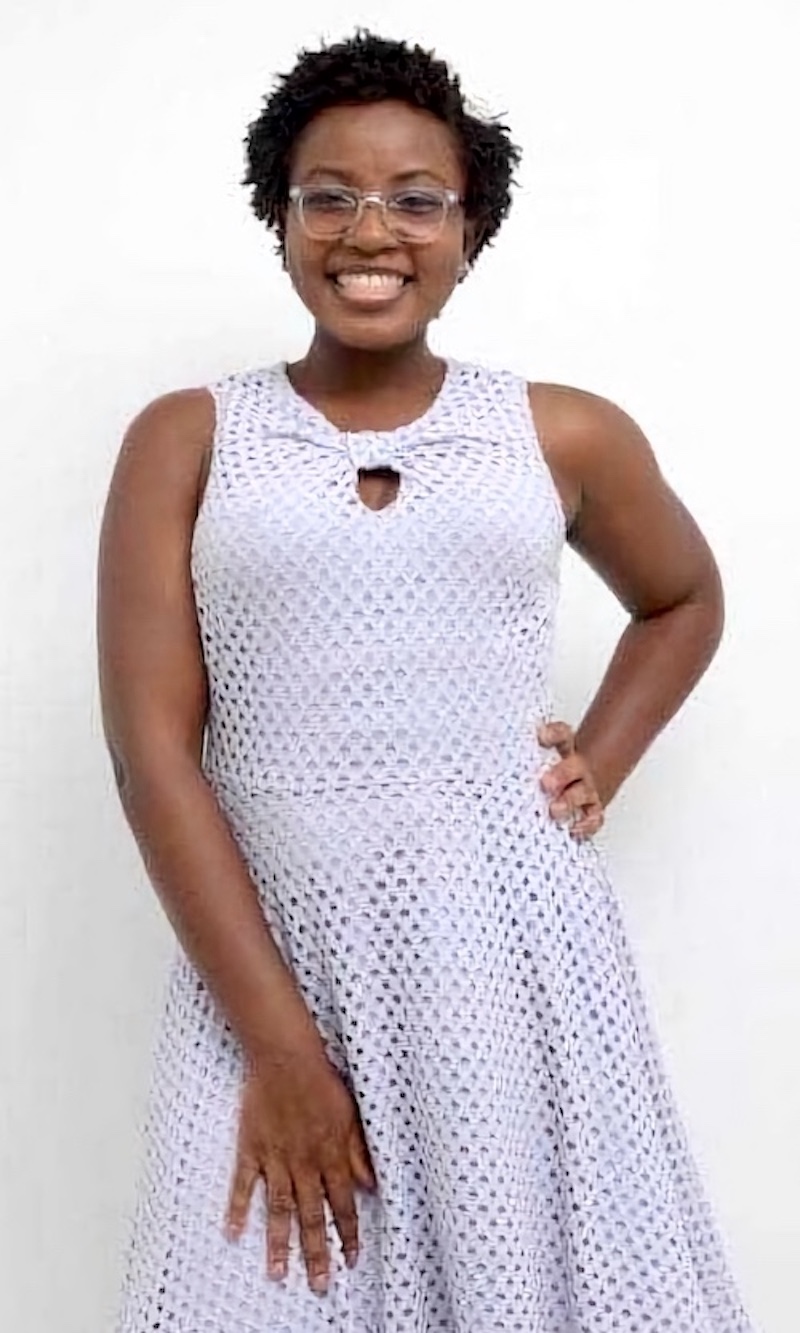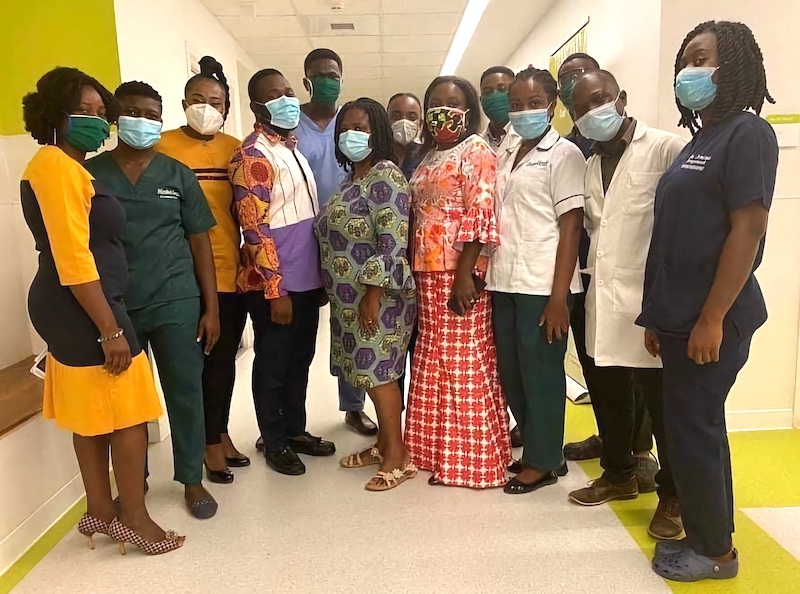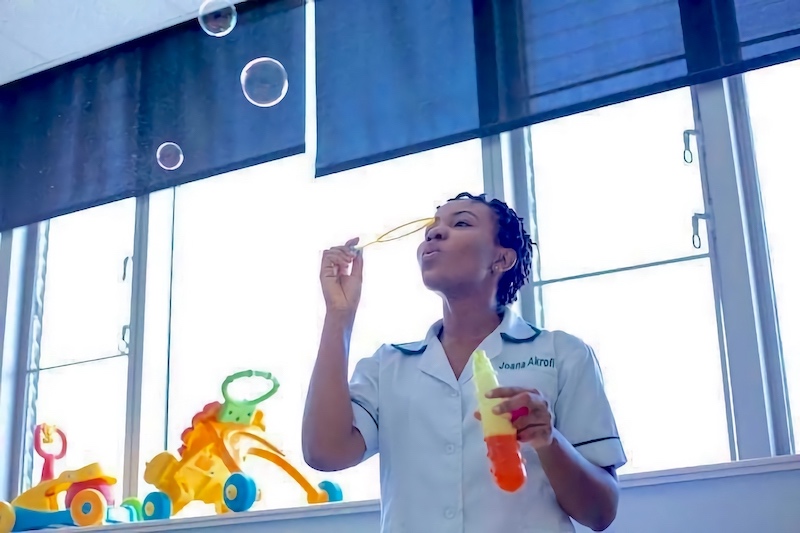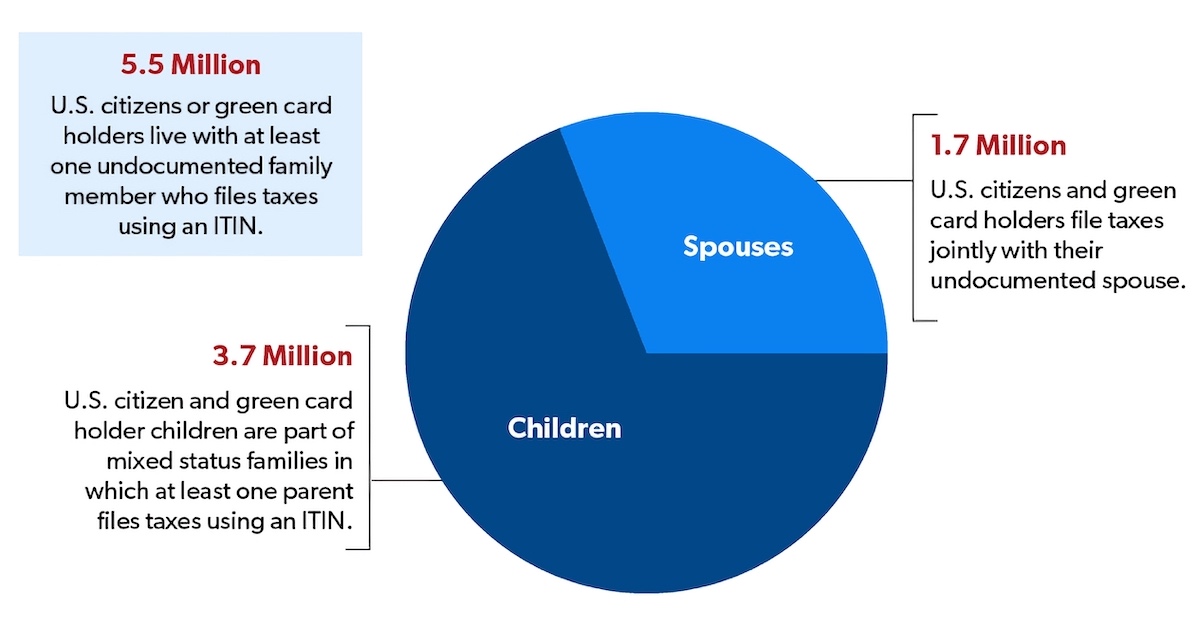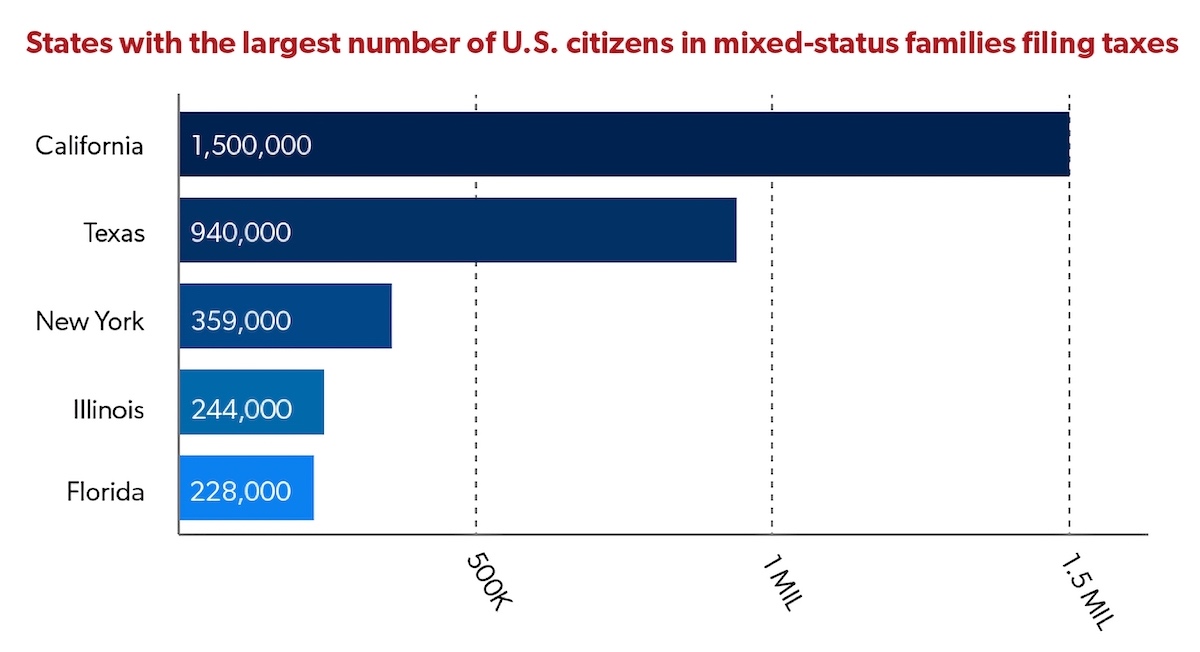Student Blog
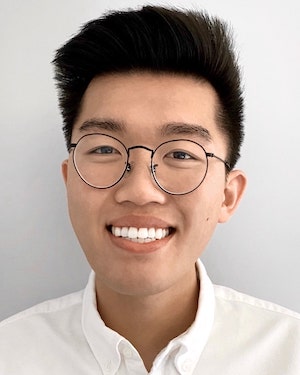
Fighting Feelings of Imposter Syndrome During Fieldwork ⟩
April 9, 2021, by Calvin
Just last week, I completed my first Level II Fieldwork at Prototypes: A Program of HealthRIGHT 360! I was placed with the agency’s Adult Full Service Partnership (FSP) Program and Children’s Program where I was able to provide individualized occupational therapy services to clients across the lifespan who struggle with mental health concerns, needs, and barriers.
This was my first full-time fieldwork placement. I was expected to be there every day from 9:00 AM to 5:30 PM, whereas my previous Level I Fieldwork placements did not require me to come as often. Although I had heard amazing things about Prototypes from previous fieldwork students, I knew that things would be different given the pandemic situation, and also just that everyone’s experience is different. I was feeling anxious about taking on telehealth services, potentially meeting clients in-person, documentation, and more. I wasn’t sure how I would fit in with the team or if I was going to represent OT well enough in the mental health field. The imposter syndrome was real. However, after my first few weeks of fieldwork, those feelings of impostorism gradually began to fade away. I was able to build my confidence to thrive in what turned out to be a beyond-stellar fieldwork experience.
My clinical instructor (CI) was the only occupational therapist at my site, but they truly advocated and raised OT awareness within our client and provider population. I am so fortunate to have had their supervision because they helped further my understanding of what occupational therapy’s role in mental health is. I also appreciated how they always challenged me to ask questions and tested my clinical reasoning and critical thinking skills. At first, I was nervous about making mistakes, but I kept reminding myself that it’s okay and that I should take those as opportunities to learn and grow. Additionally, with the rest of the agency team (inclusive of case managers, clinicians, administrative support and program directors), I felt very well supported and empowered to make an impact as an occupational therapy fieldwork student. It wasn’t long after the beginning when I started to more confidently plan clients’ treatments, document my sessions, present cases to my fellow colleagues, and really highlight the unique capacity of occupational therapy within the mental health community.
It was this sense of community and appreciation for OT that made me feel like I belonged, and uplifted me to bring my skills and knowledge of resources to the table. I was able to creatively collaborate with my caseload of clients to address hygiene management, budgeting their finances, accessing resources, accountability with task completion, social participation, engaging in habit change, and building and maintaining routines so that they can independently participate in their daily lives. I realized that this is the beautiful work of occupational therapy in mental health (and of course there’s so much more to it)! These are meaningful occupations that may be difficult for individuals to participate in because of their mental health needs and barriers. As occupational therapists, we have the power to use occupations as a means and as an ends, as well as to support our clients with health promotion and education, holistic interventions, and our therapeutic use of self.
Overcoming self-doubt and persevering through my own imposter syndrome enabled me to come out of this fieldwork with a wealth of insight, about OT and about myself. I’m grateful for My Mental Health Immersion Experience for providing me with such a solid foundation that prepared me well for this experience. Also, the interprofessional collaboration that I experienced here was extraordinary, and I am incredibly thankful for all the mental health practitioners that I was able to collaborate with. Finally, thank you to my CI, my new West Coast University OT student friends, and especially my ambassador teammate, Bethany Yew, who was placed there along with me — WE DID IT, BETHANY!!!
I am very much looking forward to transitioning into my next, and final, Level II Fieldwork for the Summer 2021 semester, and I can’t wait to continue translating everything I’ve learned through my experiences! Whether if it’s our first or last, or if it’s Level I or Level II, good luck to all of us going into fieldwork. Let’s continue to support one another and make the most out of our experiences!
⋯
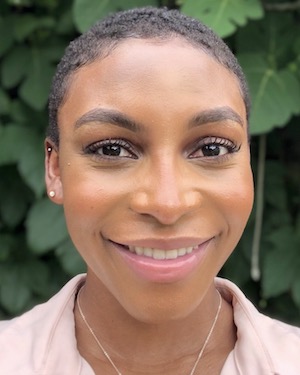
Being Black in OT: The Impact On My Future Black Clients ⟩
April 7, 2021, by Lamoni
Two weeks ago, I attended a livestream event by the Summit Performance Indianapolis called “Black Voices in OT.” It consisted of a play that highlighted common experiences of Black occupational therapy students and practitioners. Many of these experiences were negative. It was filled with micro-aggressions, insensitive statements, and harmful actions by peers, professors, and bosses. The structure of the play was interesting because it took place over a zoom call; It was two OT practitioners and one OT student having a casual check-in to release all of their frustrations regarding the racism that they experienced during work and at school. The purpose of the play was to bring attention to the fact that Black OTs have to navigate racism all while trying to balance the demands of being a graduate student, care for clients to their full capacity, maintain relationships with peers and coworkers, and remain in a positive attitude. It requires a lot of energy and it can feel even more depleting when there is not a shoulder to lean on or an ear to listen.
As I watched the play and heard the compilation of several upsetting stories which were extracted from actual surveys taken by Black OTs and OT students, I did find relief in the fact that they had each other. Between their sighs and head shakes were also moments of laughter. It reminded me of my own conversations with my family and Black friends. To be amongst people with a shared identity and shared experiences can be very therapeutic. It can be a source of reassurance and confidence. It can be the difference between getting knocked down and staying down or choosing to stand up again.
USC Chan’s incoming class of 2023 is the most racially diverse class yet. I can only hope that an increase in diversity is true for several other occupational therapy programs across the nation because we need it. I believe more representation in the field would decrease the number of negative experiences highlighted in the play. Besides that, I think being Black in OT comes with many positives for Black clients. Currently, and rightfully, the Black community has a lot of mistrust towards the healthcare system. This is due to a long history of medical abuse, neglect, and exploitation. As more Black people enter healthcare professions, trust can be restored. With trust comes more buy in; clients may be more likely to fully participate during sessions and to listen to the OT’s recommendations. This can translate to greater improvements in their condition, fewer hospital re-admissions, etc.
As a Black OT, you will be a practitioner that your Black clients can relate to. Being of the same culture typically means that there will be several shared experiences, maybe similar upbringings, or interests. This is another way to build rapport and establish a strong, trusting relationship. Additionally, you can be a source of emotional healing. We typically think of healing in terms of health conditions, but we have to remember that occupational therapy is holistic and takes into account emotional health. Racial injustices are constantly taking place around us and this undoubtedly takes a toll on Black clients’ wellbeing. If you are working in an inpatient rehab facility and your Black client does not have friends or family around to talk about what they may have recently watched on the news (for example, Black Lives Matter marches), your presence and the assumption that you understand racial trauma can promote healing. Even without speaking, you may be a source of comfort.
I will be graduating next month and while I am simply excited to soon enter the workforce in this amazing profession, I am equally excited to serve my community. I think about the general mistrust towards the healthcare system and how extra doubt may be present towards a field like OT. Many people do not know what occupational therapy is and what occupational therapists do, thus, mistrust may be amplified. Having someone from your background explain the profession, become your practitioner, and lead your interventions is not only beneficial for Black clients but for the occupational therapy profession overall. Yes, we may experience some negative moments, but I am hopeful that the good will outweigh the bad. I am also hopeful that the number of Black OT students and practitioners will rise and, in return, cause the number of unpleasant moments to fall. Continue to push towards diversOT, it benefits us all and can only make our profession better.
⋯
Transforming Western Perspectives — Continued ⟩
April 2, 2021, by Global Initiatives Team
Joana Nana Serwaa Akrofi, OT
Post-Professional Master’s student, University of Ghana Graduate, Newsletter Editor for the Occupational Therapy Africa Regional Group
By Michelle Plevack
Entry-Level Professional Master’s student
In collaboration with Brittany Inouye
Entry-Level Professional Master’s student, Global Initiatives Student Worker
In February 2021, Global Initiatives had the pleasure of hosting a Global Brown Bag Seminar featuring a variety of international occupational therapy perspectives (Transforming Western Perspectives: Lessons Learned from International OT). We are excited to highlight one of the panelists, our very own Joana Nana Serwaa Akrofi, OT, and her work as an occupational therapist in Ghana.
While Joana is currently residing in Los Angeles for the Chan Division’s Post-Professional Master’s (MA-1) program, she was born in Ghana and has worked there as an OT across a variety of settings. Before becoming an OT, Joana was an advocate for feminism and spirituality, and expresses that she has always felt she was “born to be an activist.” This mindset has translated into a sense of advocacy for occupational therapy in Ghana, where individuals with disabilities are frequently stigmatized. Following schooling, Ghanaians who complete a higher education are required to work in their field for one year in an unpaid government position. With a strong interest in pediatrics and in particular, children with autism, she spent this unpaid year working at a community-based institution where she educated teachers and students about the developmental needs of students with disabilities. This kickstarted her interest in Sensory Integration strategies for this population. While there is presently no Sensory Integration certification in Ghana, Joana hopes to pioneer SI practice using the available resources in her home country.
Although Joana’s academic journey with USC has taken place amidst a global pandemic, her positive outlook highlights the collaborative, inclusive, and diverse nature of the Chan community. She describes how communities such as Global Initiatives “helped us celebrate our roots and makes me proud to be Ghanaian.” She has felt enlightened by her experience at USC in that she had previously believed Westerners to have a negative, single narrative about the people of Ghana. Having now interacted and worked with not only Americans, but a wealth of diverse individuals in the MA-I cohort, Joana has become reassured by the solidarity within her classrooms and the Division as a whole. She described feeling inspired by both her professors and classmates’ experiences, which I in turn relate to, feeling inspired by Joana’s confidence and resolve.
Joana’s voice holds great fortitude and passion while envisioning her hopes for occupational therapy in Africa. She describes the profession as going through a phase, and dreams of establishing occupational therapy in Ghana in a way that is relevant to Ghanaians. In contrast to the United States, in Ghana, interdependence within the local community is valued and ‘needing help’ is less taboo. It is not strange for extended families and friends to want to help nurture each other during times of need. She hopes to integrate these values into her practice as an OT. While Western viewpoints focus on independence in activities of daily living (ADLs), decolonizing that perspective would mean realizing that group facilitation of these same ADLs can actually bring community members together in a healing way.
If she could give one word of advice for anyone interested in working in Africa or abroad in general, it is to “go in trying to learn rather than trying to teach,” which is ironic in that while Joana is here at USC to learn, she has subsequently taught us so much.
Bubble activity used to engage children with Autism Spectrum Disorder (ASD) before beginning sessions
⋯
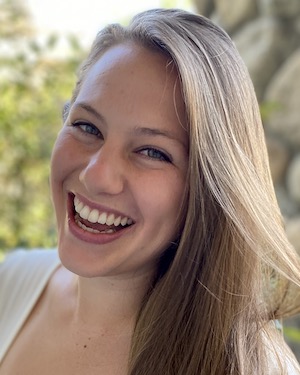
Preparing for Graduate School ⟩
March 31, 2021, by Savi
As an ambassador, I have had the privilege of communicating with a large group of admitted Entry-Level Master’s students over the past few weeks. These students have expressed that they are both excited and nervous about what is to come. I definitely shared the same kind of emotions back when I was admitted. As an admitted student, you don’t know exactly what the future holds. For that reason, I have been receiving a lot of questions regarding how to best prepare for graduate school.
My biggest piece of advice is to forget about the idea of “preparing yourself” for the program in the typical way you may imagine.
Do not try to cram in as much reading about anatomy and physiology as possible before you enter into your summer session like I did. I promise you that it is not necessary (really . . . I’m not lying to you)! All I did by studying that material in my free time was tire myself out before I even sat down for my first day of class. Your professors have designed each course to cater to a wide range of prior knowledge levels, so don’t focus your time on studying material that will either be reviewed or is unnecessary to know.
Instead, take the next few months (or whatever time you have remaining before the start of the program) and relax as much as you can. Enjoy and appreciate every aspect of the life you are currently living and use the remaining hours you have in the day to participate in restorative occupations. Read that book you’ve always wanted to read, go on that hike you’ve been eyeing on the All Trails app, or watch that movie you’ve had saved on “your list” on Netflix because soon your life will become a lot busier. A lot of the free time you may have after work, on the weekends, or in between undergraduate classes will soon turn into time focused on finishing your homework, reviewing textbook readings, completing an essay or group project, or studying for the exam you have the next week.
The best way to prepare yourself for what is to come is by focusing on doing things you enjoy in your free time and acknowledging that the routine you are currently following will be drastically changed in a few short months.
So to all the admitted students out there reading this blog . . . know that it is OK to use this time to focus on taking care of yourself in order to be energized and mentally ready to take on whatever the next two years have in store for you. After you sit down for your first day of OT school, you can never go back to the place you are right now in your life. Take a deep breath and know that you will be able to tackle anything and overcome any hurdle that may come your way . . . but only if you focus on taking care of yourself before you start! I promise you’ll thank me later 😉
⋯
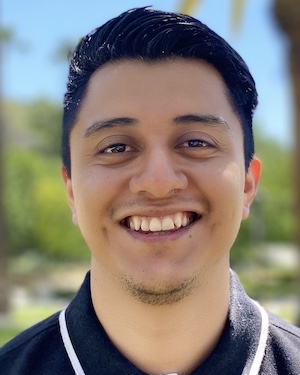
Mixed Status Families ⟩
March 29, 2021, by Daniel
Admissions Classes Diversity Fieldwork Life Hacks
According to the National Immigration Law Center, “a mixed-status family is a family whose members include people with different citizenship or immigration statuses. One example of a mixed-status family is one in which the parents are undocumented, and the children are U.S. born citizens”. The state of California has the largest number of U.S. citizens in mixed status families filing taxes, at 1.5 million people. This is a topic I would like to bring more attention to because many people may come from or know someone from a mixed status family, this includes students at USC and clients seen during fieldwork or residency, and this may not be something that is often brought up in the classroom. Personally, I live in a mixed status family, which includes DACA recipients and people without any documentation, with some extended family having other statuses as well.
Source: Migration Policy Institute, “Mixed-Status Families Ineligible for CARES Act Federal Pandemic Stimulus Checks” (May 2020), migrationpolicy.org/content/mixed-status-families-ineligible-pandemic-stimulus-checks
Source: Migration Policy Institute, “Vulnerable to COVID-19 and in Frontline Jobs, Immigrants Are Mostly Shut Out of U.S. Relief” (April 24, 2020) migrationpolicy.org/article/covid19-immigrants-shut-out-federal-relief
This past year has been really tough financially for my family and me. The multiple stimulus packages that were passed came with a lot of limitations for mixed status families. For example, as a USC student who is undocumented with DACA status, I was unable to apply to the CARES Act financial assistance for college students. After doing some research and waiting for the final relief bills to be amended and passed, I was fortunate to receive the stimulus check because I have a temporary work permit via DACA. However, not all undocumented students are DACA recipients, and many undocumented people did not qualify for anything, even though they pay taxes every year with an Individual Taxpayer Identification Number (ITIN) number. In the last year, I saw many people be excluded from federal assistance simply because of their immigration status, personally at home, with friends, and at residency. My parents and many of my clients in primary care were impacted by the exclusions in the COVID-19 relief bills, including the most recent under the Biden administration.
During this time, many families continue to rely on food banks, are behind on rent, and are surviving on the little help they can get. For example, I helped my parents and some of my clients apply to local and state specific relief programs which provided some financial assistance, but not nearly enough. And for many it’s not an easy process due to technology access, literacy levels, social support, etc. Last fall, I helped my parents write a letter and email it to a rent relief program that provided $500. I was appreciative that non-profit organizations and certain school departments took it upon themselves to be more inclusive and provide some type of financial assistance for students that may have not qualified for the CARES Act. As a current student, I was able to apply for the USC Ostrow Emergency Fund, the USC Graduate Student Government Emergency Assistance, and Immigranted (non-profit organization) for financial assistance to get through the year. Most of that assistance and my stimulus checks went to home expenses that my parents were simply unable to cover.
I believe this is an important discussion we need to have or at least consider in the academic setting and occupational therapy world. As I stated earlier, this impacts students at USC and in the OT programs, as well as clients being seen by occupational therapists/residents and/or fieldwork students. It’s important to consider how students may be navigating their own experience within a mixed-status family or perhaps have family/friends, clients, or colleagues that are experiencing this. As the Chan Division continues to push for more diversity and students from different backgrounds come in, it’s important to consider how prepared we are to support their education and clinical experience within the context discussed above.
No matter your political views, from an occupational therapy lens, we all have a responsibility to promote occupational engagement and occupational justice. This may include supporting clients navigating access to resources. As I found myself doing with my family and clients in primary care, I was that person that supported their own resource seeking as a means for survival during the pandemic. The reality is that not everyone has access to OT services or a family member who can help them seek resources. This is a very complex topic and there are many layers to it, perhaps many terms you may not be familiar with. I am always available for any questions (.(JavaScript must be enabled to view this email address)). I ask you to be open minded and encourage you to have these uncomfortable conversations. It is never too late to start learning and getting involved in the discussion. The COVID-19 pandemic revealed and exacerbated many of the disparities and social inequalities that have been there for many people in the United States, especially the undocumented population. I want to leave you with the questions below to reflect on:
- As a current or future occupational therapist, how are you going to support clients experiencing occupational injustices due to their immigration status?
- How are the needs of students within mixed-status families being met? How can we best support them in reaching their educational and professional goals?
References
Chishti, M., & Bolter, J. (2020, December 11). Vulnerable to COVID-19 and in Frontline Jobs, Immigrants Are Mostly Shut Out of U.S. Relief. Migrationpolicy.Org. https://migrationpolicy.org/article/covid19-immigrants-shut-out-federal-relief
Fact Sheet: Mixed Status Families and COVID-19 Economic Relief. (2020, August 13). National Immigration Forum. https://immigrationforum.org/article/mixed-status-families-and-covid-19-economic-relief
Mixed-Status Families Ineligible for CARES Act Federal Pandemic Stimulus Checks. (2020, December 9). Migrationpolicy.Org. https://migrationpolicy.org/content/mixed-status-families-ineligible-pandemic-stimulus-checks
The Affordable Care Act & Mixed-Status Families. (2017, October 20). National Immigration Law Center. https://nilc.org/issues/health-care/aca_mixedstatusfams
⋯






